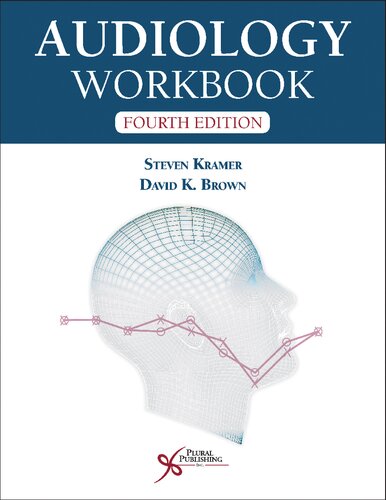

Most ebook files are in PDF format, so you can easily read them using various software such as Foxit Reader or directly on the Google Chrome browser.
Some ebook files are released by publishers in other formats such as .awz, .mobi, .epub, .fb2, etc. You may need to install specific software to read these formats on mobile/PC, such as Calibre.
Please read the tutorial at this link: https://ebookbell.com/faq
We offer FREE conversion to the popular formats you request; however, this may take some time. Therefore, right after payment, please email us, and we will try to provide the service as quickly as possible.
For some exceptional file formats or broken links (if any), please refrain from opening any disputes. Instead, email us first, and we will try to assist within a maximum of 6 hours.
EbookBell Team

5.0
40 reviewsAudiology Workbook, 4th Edition
Audiology Workbook, Fourth Editions a companion study aid to the textbook, Audiology: Science to Practice, Fourth Edition. It can also serve as an appropriate supplement to other introductory audiology textbooks or class lectures. The Audiology Workbook focuses on exercises and questions in hearing and vestibular science and audiology clinical principles and procedures that are beneficial for students in an undergraduate communication science and disorders program and those in a graduate-level AuD program. It is also a great study resource for the Audiology Praxis Exam.
The fourth edition is composed of an abundance of questions and activities designed to reinforce students' knowledge of concepts and procedures that are, traditionally, difficult to master. There are questions and activities on 1) properties of sound, such as drawing waveforms; calculating frequencies periods, amplitudes, and phases, 2) auditory and vestibular anatomy and physiology of the auditory and vestibular systems, including diagrams to label, 3) procedures for obtaining pure-tone thresholds and interpreting describing audiograms 4) masking for pure-tone and speech tests, 5) performing and interpreting speech test, tympanograms, wideband acoustic immittance, acoustic reflexes, 6) understanding and interpreting evoked physiologic responses, including OAEs, ABRs, ECochG, ENOG, VEMP, 7) clinical case studies for common hearing and balance disorders, 8) treatment, including hearing aids, implantable devices, cerumen management, tinnitus, and aural rehabilitation.
The exercises are comprehensive and designed so they may be solved with relatively short answers and useful for group discussion. The popular exercises from previous editions have been retained, updated, and expanded, including those on audiogram interpretation, masking, immittance, and case studies. Comprehensive answers are also included for each chapter.
New to the Fourth Edition
Expanded exercises on the scientific foundations from the previous edition as well as new questions added on wavelength, resonance, decibels, signal-to-noise ratio, complex vibrations, stages of transduction through the auditory system, and psychoacoustics.
Many new and figures of auditory and vestibular anatomy.
New exercises related to clinical topics, including preparation for patient testing, case history, wideband acoustic immittance and evoked physiologic responses.
New chapter with exercises on hearing aids, assistive listening technologies, and implantable devices.
Each chapter now ends with a set of multiple-choice questions.